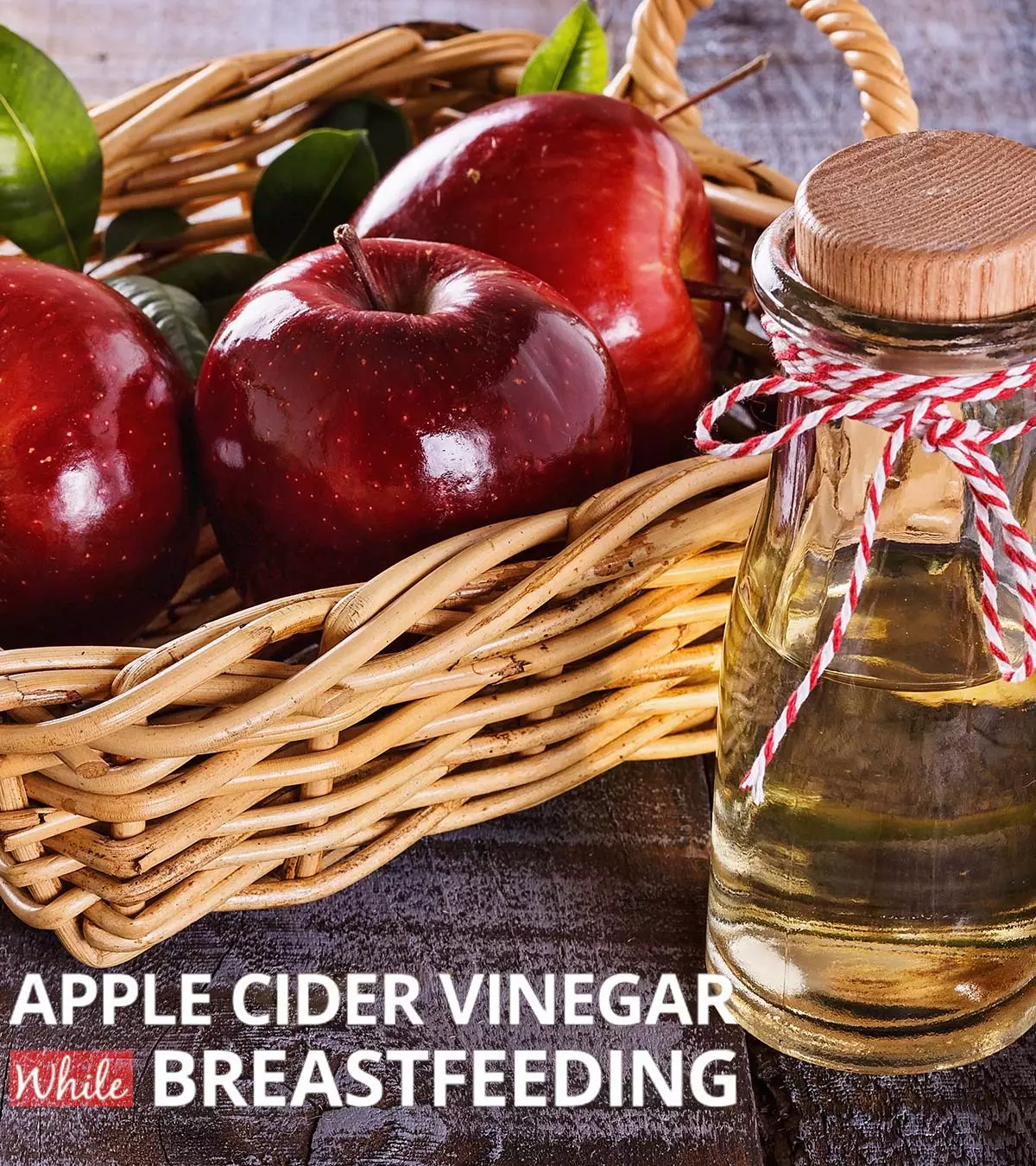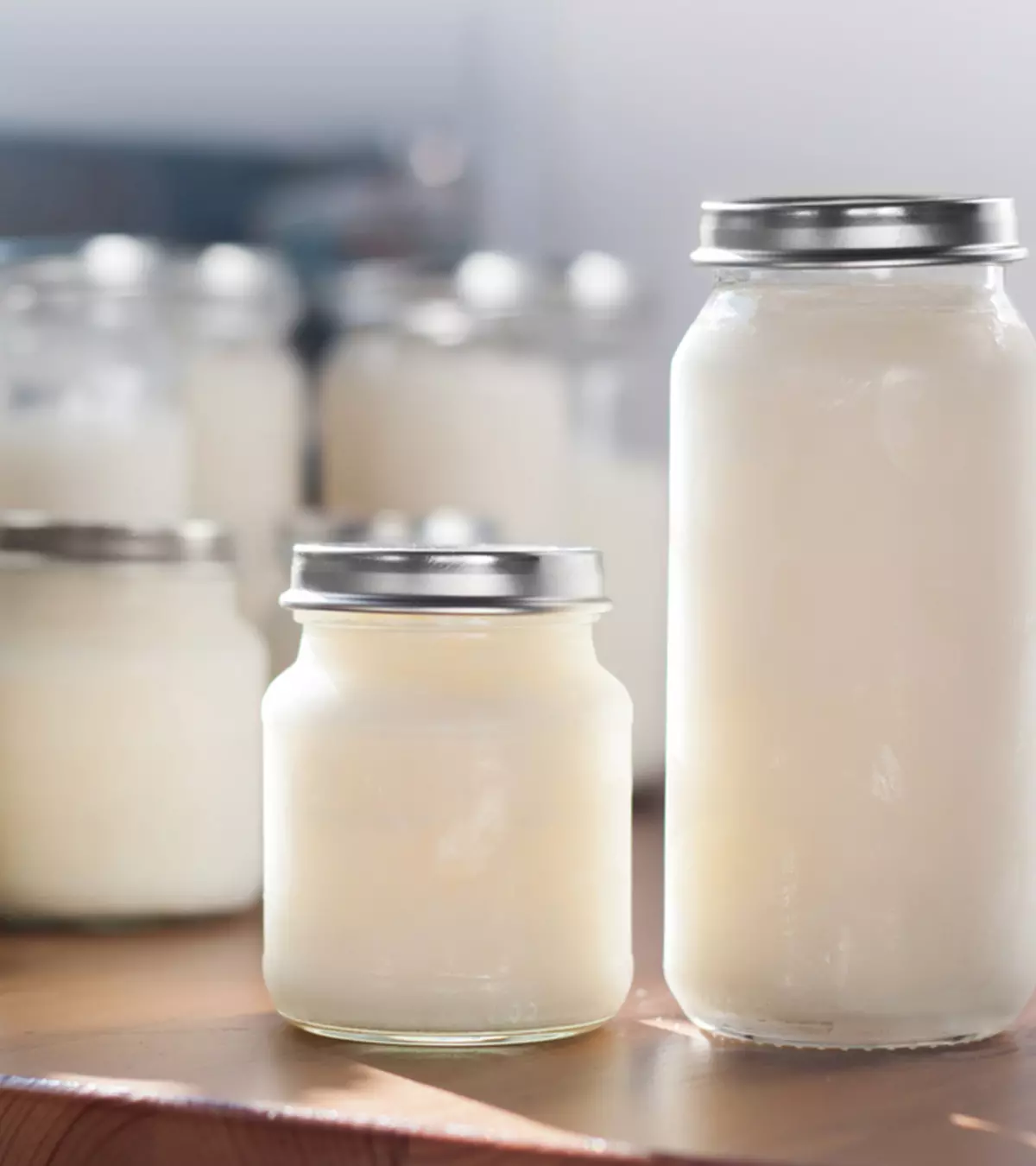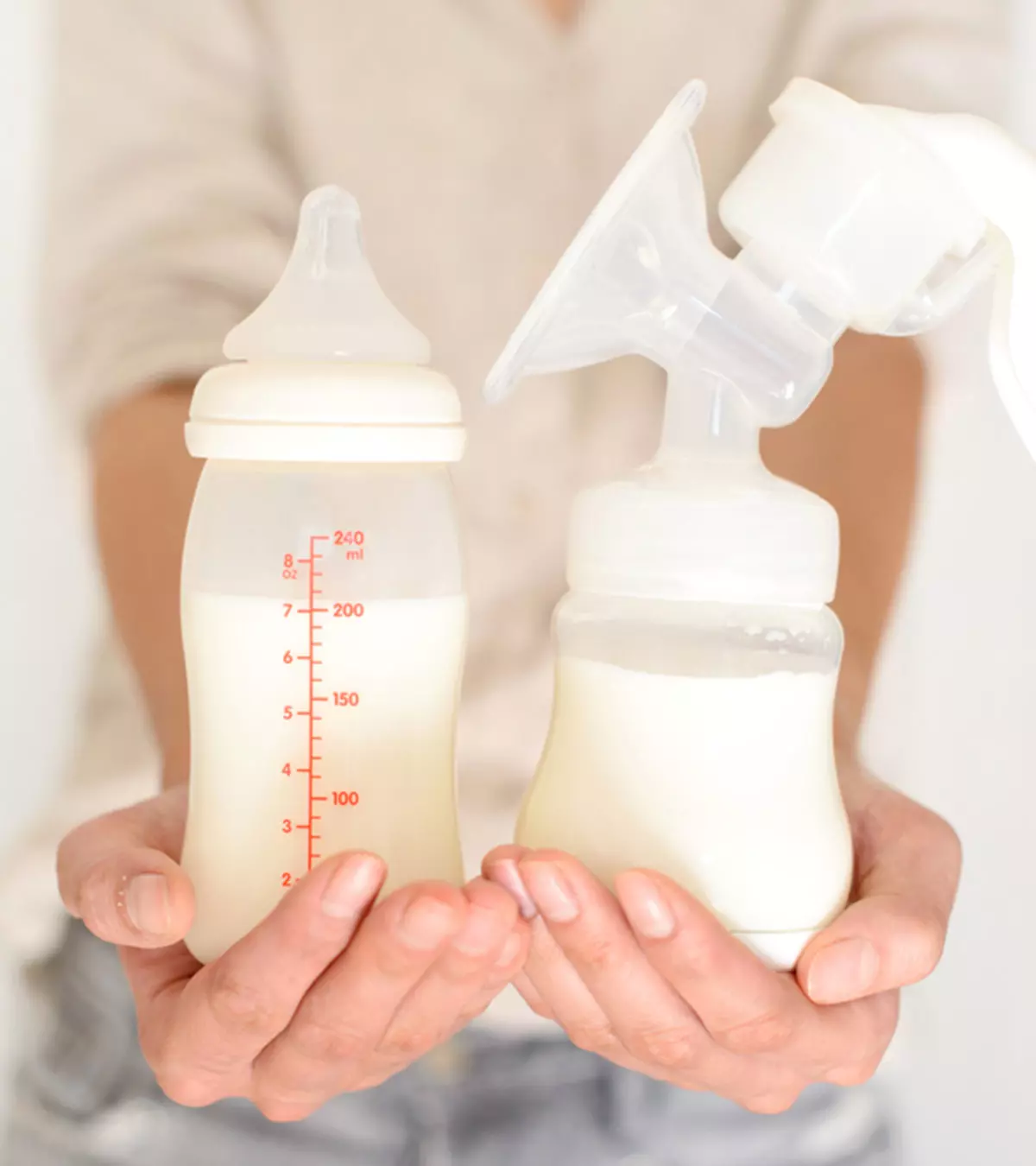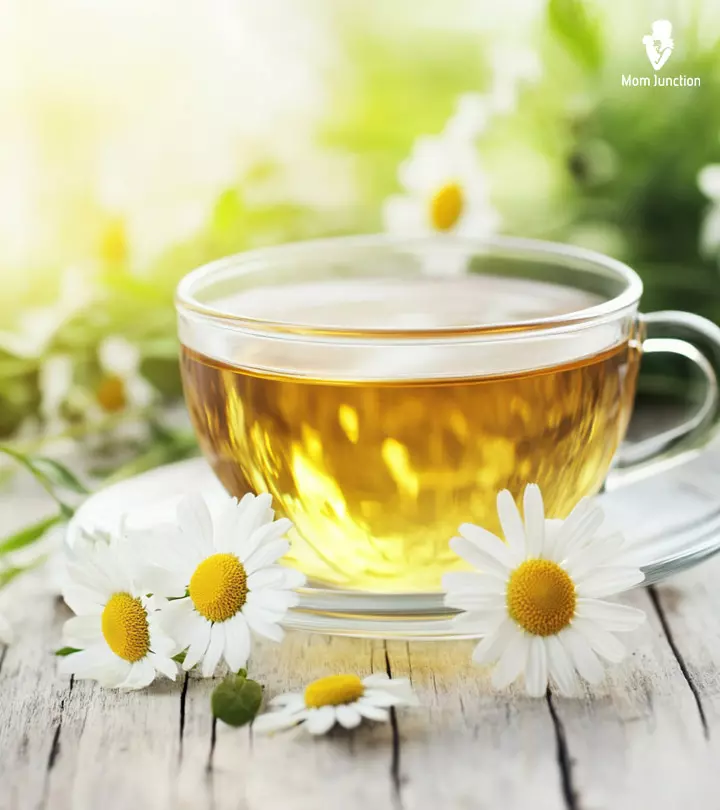
Image: Midjourney/ MomJunction Design Team
Chamomile tea is a popular beverage prepared by steeping dried chamomile flowers in boiling water. It is widely popular for its calming effects and distinctive therapeutic properties. You may consider taking chamomile tea when breastfeeding for its anti-inflammatory, anti-anxiety, anti-depression, and lactogeniciA substance or hormone that induces the production of milk effects. However, most of these effects aren’t well researched.
Hence, the effect of chamomile tea on lactating women and their nursing babies is still unclear. Keep reading to know more about the safety of chamomile tea for lactating women as a natural remedy, its effects on breast milk supply, possible benefits, and precautions you should observe while drinking it as part of your postpartum care diet.
Key Pointers
- Chamomile tea is known for its calming effects and distinctive therapeutic properties. It is recommended for breastfeeding mothers because of its anti-inflammatory, anti-anxiety, anti-depression, and lactogenic effects.
- It is said that chamomile tea has galactagogue effects, but there is insufficient evidence to prove this.
- Chamomile tea, however, may improve your sleep, control anxiety and panic issues, boost immunity and digestive health, and help with overall health.
- Make sure to consume good quality chamomile tea from a reputed brand and choose tea bags over loose tea to prevent contamination.
- Consumption of chamomile tea may cause side effects, and discontinue its consumption if allergic reactions occur.
Is It Safe To Consume Chamomile Tea When Breastfeeding?

Image: Shutterstock
The US Food and Drug Administration (US FDA) categorizes chamomile as generally recognized as safe (GRAS) to use as a spice, seasoning, or flavoring agent (1). However, the safety of chamomile tea for lactating mothers lacks clinical evidence. Also, the safety of chamomile tea for babies who are being breastfed is unclear. Therefore, consult a doctor or lactation expert before adding chamomile tea to your diet. Your healthcare provider can also guide you about the safe intake limit of the tea.
Does Chamomile Tea Increase Breast Milk Supply?
Anecdotal evidence suggests that chamomile tea has galactagogueiA food or milk that increases the flow of breastmilk effects (1) (2). But, the effects may vary among breastfeeding mothers. There is also insufficient research to establish its effects on breast milk production. The best way to increase milk production is through nursing on demand, or pumping regularly. Hannah Whittaker, an expert pediatric and pregnancy dietitian from Liverpool, England, says, “At present, some studies have shown varying evidence that chamomile tea can increase breastmilk supply. Due to this, it is unethical to say that taking chamomile tea will increase milk supply. I wouldn’t advocate breastfeeding mums using chamomile tea to increase their milk supply. The way to do so would be to use a breast pump between feeding and massage the breast to stimulate milk flow.”
Possible Benefits of Chamomile Tea When Lactating
Being one of the herbal remedies, consumption of chamomile tea may provide the following benefits to breastfeeding mothers.
- May give you a good sleep: A randomized clinical trial demonstrated the possible effectiveness of chamomile tea in alleviating depression and improving sleep quality in postpartum women (3). This effect is attributed to apigenin, a flavonoid that may promote sleep (4).

Image: Shutterstock
- May control anxiety and panic issues: A few pieces of research suggest that chamomile oil may have antidepressant and anxiolytic (anti-anxiety) effects that can help provide anxiety relief (4) (5).
- May boost immunity: Some herbalists claim that chamomile tea can boost immunity and help fight infections associated with cold. However, clinical studies to validate this claim are insufficient (4).
- May improve digestive health: Chamomile has been used traditionally to treat gastrointestinal issues, such as indigestion, gas, flatulence, diarrhea, nausea, and vomiting.

Image: Shutterstock
- May enhance overall health: Research studies indicate the anti-diabetic and cardioprotectiveiA substance that helps protect coronary arteries and the heart from an injury effects of chamomile tea (6) (7) (8). Bioactive compounds, like apigenin, quercetin, patuletin, luteolin, etc., have anti-inflammatory and antioxidant effects responsible for these benefits (9). Apart from these, flavonoids, like those found in chamomile tea, may help manage other conditions, such as osteoporosisiA medical condition that makes bones brittle and weak (4) (10).
 Quick fact
Quick factConsult your healthcare provider regarding the use of chamomile tea with a well-balanced breastfeeding diet to reap its health benefits.
How To Select Chamomile Tea?
Supposed healthy beverages are found aplenty in every food market. However, if you consume chamomile tea, ensure you buy a good quality variety and store it correctly.
- Buy tea manufactured by a reliable brand and sold at a trustworthy store. It ensures that you get unadulterated chamomile tea processed with hygiene standards. Go for brands that are USDA-certified organic.
- Prefer tea bags to loose tea to avoid contamination. Loose chamomile tea sold in herbal stores may have contaminants, like spores, that may trigger allergic reactions. Teabags may minimize the risk of contamination. If you like loose tea, then choose a factory-sealed pack.
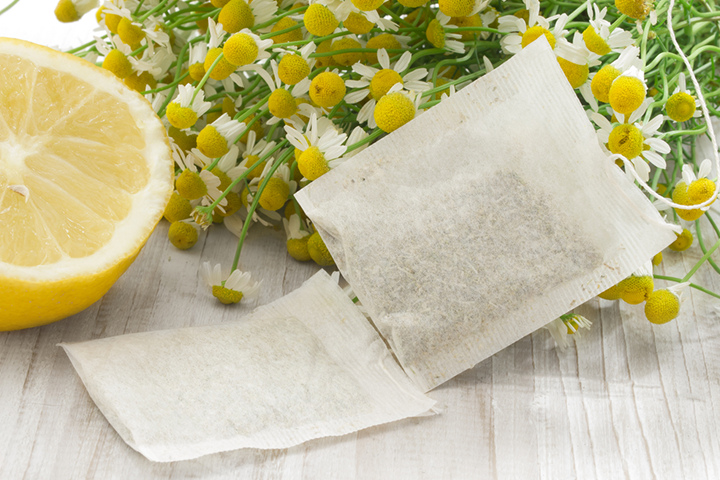
Image: Shutterstock
- Check the ingredient list for added ingredients. Several over-the-counter herbal teas contain more than one herb and other added ingredients (11). For instance, some common additives you may find in chamomile tea are star anise, buckthorn bark, comfrey, and senna.
Store the tea bag or loose tea in an airtight container away from direct sunlight.
Precautions To Take While Consuming Chamomile Tea During Lactation
Observe the following precautions while making chamomile tea a part of your diet.
- Look out for any side effects when consuming the tea for the first time. Common side effects include nausea, dizziness, and abdominal discomfort.
- Prepare the tea as directed on the pack. Highly concentrated tea may cause nausea and vomiting.
- It is advisable to start with a small quantity of chamomile tea, such as one cup per day, and observe any changes in both the mother and the baby. Gradually increase the amount if no adverse effects are noted.
- Do not pick chamomile tea or any herbal tea while breastfeeding that is advertised to boost milk production without proper guidance. Such products are likely to have more than one herb and some added ingredients that may not be safe during lactation.
- Discontinue consuming chamomile tea if you develop allergies, such as wheezing, vomiting, cramps, diarrhea, and skin rash (12). Chamomile allergy is likely to happen in individuals allergic to other plants in the daisy family, such as ragweed and chrysanthemum (4) (13).
 Be watchful
Be watchful
Image: Shutterstock
Stop consuming the tea and consult a doctor if you notice any allergy symptoms in the baby or if the baby does not seem to be getting adequate milk.
Can Chamomile Tea Help With Colic In A Baby?
Whittaker opines, “Colic is a symptom, not a clinical condition and the cause of colic is unknown. It is thought that it may be due to gastrointestinal development, which improves with age, but this is not clear. A study from 2007 did show some improvement in symptoms for babies with colic when given 150ml of chamomile tea per day (however this was combined with other herbs). At present, in clinical practice, I would not recommend chamomile tea to my clients.”
Frequently Asked Questions
1. Can chamomile tea help with skin irritations while breastfeeding?
Chamomile is known for its antioxidant, antiseptic, and anti-inflammatory properties. Chamomile-based topical ointments may help minor skin infections, aberrations, rashes, and sunburns (16) (17).
2. Can chamomile tea help with nipple soreness while breastfeeding?
Chamomile tea is known for its therapeutic properties that may help soothe sore and cracked nipples (17). You may also consider chamomile-based topical ointments for cracked nipples. Make sure the ointments are safe for newborns, and apply them after a feed.
3. Can chamomile tea interact with other herbal remedies?
While chamomile tea is generally considered safe, it’s essential to consult with a healthcare provider before combining it with other herbal remedies or medications. There have been reported adverse interactions with certain herbal products and prescription drugs. Specifically, it may interact with certain vitamins and sleep-inducing herbal supplements such as St. John’s wort, 5-HTP, melatonin, California poppy, and catnip (18).
Consuming chamomile tea when breastfeeding is usually considered safe. However, it is good to check with your healthcare provider before starting its regular intake. Chamomile tea may be seen as a beverage that promotes stress relief and relaxation. It is also known to improve breast milk production, but more research is required to establish the claim. Nevertheless, it is a good source of antioxidants and anti-inflammatory agents that may benefit overall health by improving digestion, immunity, and also be an effective sleep aid. But ensure you know the safe limits and choose a reliable brand before purchasing chamomile tea to enjoy its benefits.
Infographic: Benefits And Precautions Of Chamomile Tea While Breastfeeding
Drinking herbal tea is known to relieve signs of anxiety and depression. These are the common signs experienced by a new lactating mother during the postpartum period. In the following infographic, we have listed a few benefits of chamomile tea. Also, we share a list of precautions that you should know about. So read on and decide if you should consume it or not. Illustration: Momjunction Design Team
Illustration: Benefits Of Having Chamomile Tea While Breastfeeding
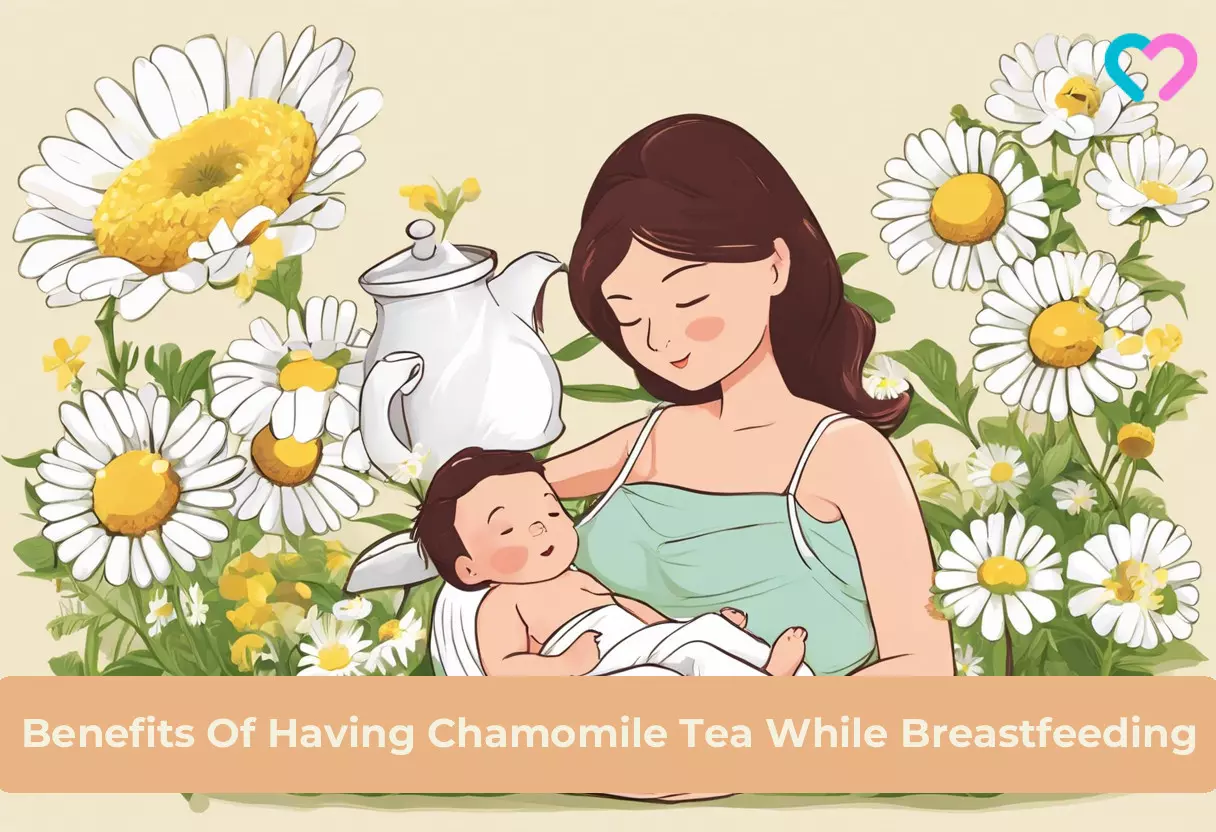
Image: Stable Diffusion/MomJunction Design Team
Take a glance at the amazing health benefits of chamomile tea! Learn how it can help improve digestion, reduce stress, and more from this informative video!
References
1. Chamomile; Drugs and Lactation Database; NCBI
2. Fernando V Silva et al.; Chamomile Reveals to Be a Potent Galactogogue: The Unexpected Effect; NCBI
3. Shao-Min Chang and Chung-Hey Chen; Effects of an Intervention With Drinking Chamomile Tea on Sleep Quality and Depression in Sleep Disturbed Postnatal Women: A Randomized Controlled Trial; NCBI
4. Janmejai K Srivastava et al.; Chamomile: A herbal medicine of the past with bright future; NCBI
5. Jay D. Amsterdam et al.; Chamomile (Matricaria recutita) May Have Antidepressant Activity in Anxious Depressed Humans – An Exploratory Study; NCBI
6. Maryam Zemestani et al.; Chamomile Tea Improves Glycemic Indices and Antioxidants Status in Patients With Type 2 Diabetes Mellitus; NCBI
7. M Rafraf et al.; Effectiveness of Chamomile Tea on Glycemic Control and Serum Lipid Profile in Patients With Type 2 Diabetes; NCBI
8. Selected Herbal beverages commonly consumed in different parts of the world; NCBI
9. Diane L McKay and Jeffrey B Blumberg; A Review of the Bioactivity and Potential Health Benefits of Chamomile Tea (Matricaria Recutita L.); NCBI
10. Connie M. Weaver et al.; Flavonoid Intake and Bone Health; NCBI
11. The Hidden Health Benefits of Tea; Penn Medicine
12. Allergy information for: Camomile (Matricaria chamomilla); University of Manchester
13. Chamomile; University of Michigan
14. Health Benefits of Chamomile Flower; Star Health
15. Roman Chamomile; Icahn School of Medicine at Mount Sinai
16. Chamomilla (Matricaria recutita); The Health and Food Supplements Information Service, PAGB
17. Chamomile; The University Of Texas At El Paso
18. Jahangir Moini et al.;Chapter 8 – Dietary supplements and herbal remedies; Neuropsychopharmacology
Community Experiences
Join the conversation and become a part of our nurturing community! Share your stories, experiences, and insights to connect with fellow parents.
Read full bio of Rebecca Koyf
- Hannah Whittaker is an expert pregnancy and pediatric dietitian with nearly 20 years of experience, the last 7 years as a registered dietitian. She manages her private practice Bump2baby Nutrition in the UK, having done her graduation in community nutrition and dietetics from Liverpool John Moores University & University of Chester respectively.
 Hannah Whittaker is an expert pregnancy and pediatric dietitian with nearly 20 years of experience, the last 7 years as a registered dietitian. She manages her private practice Bump2baby Nutrition in the UK, having done her graduation in community nutrition and dietetics from Liverpool John Moores University & University of Chester respectively.
Hannah Whittaker is an expert pregnancy and pediatric dietitian with nearly 20 years of experience, the last 7 years as a registered dietitian. She manages her private practice Bump2baby Nutrition in the UK, having done her graduation in community nutrition and dietetics from Liverpool John Moores University & University of Chester respectively.
Read full bio of Swati Patwal
Read full bio of Rohit Garoo
Read full bio of Shinta Liz Sunny














